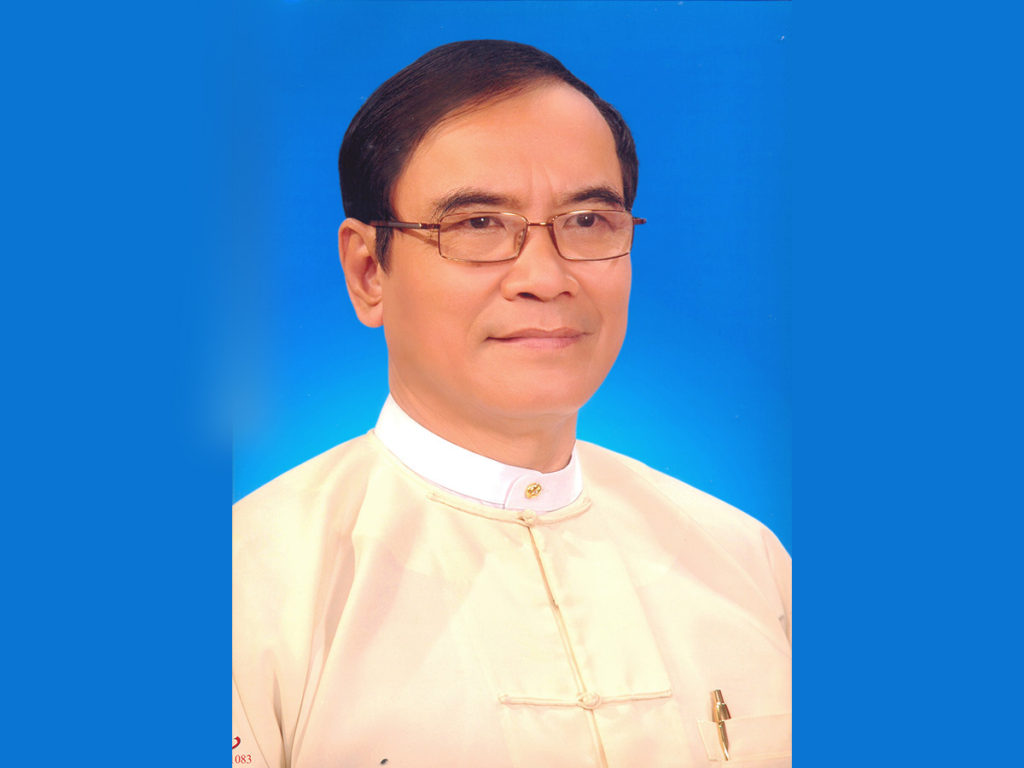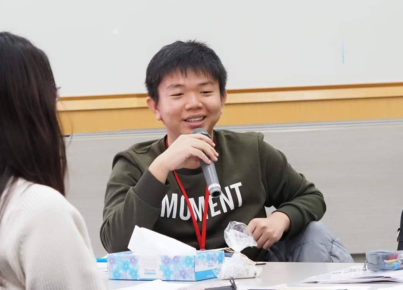“Joining Hands in the Building of a New Normal Life — Looking beyond Covid-19”
Myo Khin
Ministry of Health and Sports, Medical Doctor
Myanmar
The current outbreak of the COVID-19 has caused global crisis including both human fatalities and economic downturn. Currently, the pandemic is still lingering on in the ASEAN region and in Japan. Very soon, Japan will be entering into the winter season and ASEAN countries will be also approaching the cold season. Influenza viruses could also surge in the preceding months and maximum alert for preventive measures should be called on and countries should be prepared for the worst situation. The situation may present challenges for the health systems and health facilities, since both diseases present many similar symptoms.
However, many of the same measures that are effective in preventing COVID-19 are also effective for preventing influenza, including physical distancing, hand hygiene, covering coughs, ventilation and masks. Since COVID-19 has been with us for more than three quarters of the year 2020, people knew the basic facts about the COVID-19 infection; the features of the disease, how it is commonly transmitted and the possible outcomes. It is very important for everyone to live base on these facts. If the disease is not detected at an early stage, it could spread to 10 other persons who had been in close contact with the index person. From these 10 close contacts people, it could spread to about 100 persons. It might even exceed more than 100 in places where several people stay or work together such as in institutions or factories. That is why it is very important to be careful and vigilant.
It is beyond doubt that COVID-19 changed the lifestyle of the people all over the world. The changes in Myanmar need to be highlighted as the changes are happening at my office, my clinic and my home. We are now under “the stay at home program” in my hometown, Yangon. I had to suspend my clinic and I could not attend important meetings in-person as all domestic and international flights are suspended. There is also a limit to the number of people that can gather and even when gathering we have to obey the safe distancing guidelines. Restaurants do not allow sit-ins and only takeaways are allowed. Religious gatherings are also prohibited and pagodas, churches, mosques are also closed to the worshippers.
While we all fervently hope that the COVID-19 pandemic will end soon, we all have to remind ourselves that, as this pandemic continues to affect various aspects of our lives, new pattern of lifestyles, new form of cooperation, and work modalities under a new normal will need to be adopted.
The COVID-19 pandemic has taught us many things on health, education, and social life. For a medical person like me the most important lesson is that the health system of the countries in the world should be more robust and responsive to global crisis. Challenges from the emerging infectious diseases should be seriously considered and the health spending in the future years should be contributed significantly to the public health activities, disease surveillances, research, development of diagnostics and hospital facilities to handle serious medical conditions. Among the Sustainable Development Goals (SDGs) that were adopted by the United Nations Member States in 2015 as a universal call to action to end poverty, protect the planet and ensure that all people enjoy peace and prosperity by 2030, SDG 3: “Good health and Well Being” which focus on health should be well taken into account. The COVID-19 pandemic has highlighted the need to invest more in the SDG 3. It is evident that many countries are not well equipped and unprepared to face this deadly situation. Health spending on SDG3 should be significantly increased as evident from the present situation that many other SGDs could not be managed well enough when the health situation is crippled.
The governments should invest more in health in all countries. It is impossible to prepare for every health emergency but the health system need to be better skilled and better geared up to face the future emergencies and challenges. Current hospital structure and lay out in many hospitals are not able to comply with infection control measures and difficult to isolate infectious persons and persons under surveillance. “Health Care model innovation “should be seriously considered. Tele-health consultations, remote monitoring of health should be considered as one of the key trends driving the technology investments in health care. These services can reduce the burden of out-patient attendance in busy hospitals and benefit the high risk group like the elderly people who often have morbidity challenges to access to the health care facilities.
The fight against the COVID-19 pandemic cannot be tackled by a single country. Countries over the world need to work together and to join hands in the fight. However, differing ideologies, political differences and management styles hinder such commitments. For ASEAN countries there were similarities in terms of social, environmental and economic issues. ASEAN countries could combine their strength and work together with Japan could reinforce the Fukuda Doctrine’s teaching of “heart to heart relationship”. Fukuda’s doctrine is based to enhance friendship and relationship between Japan and the ASEAN Countries. The ASCOJA network has been in place for over 20 years. ASCOJA is working very closely with ASJA and with the recent formation of a parliamentary committee; the ties have reached the near maximum. Japan and ASEAN countries should cooperate to overcome this serious situation and should also plan to strengthen the health sector and health care resources in the Region. Japan with an aging population needs young health care workers from the Region for support and the ASEAN countries need technology to support the research on the respiratory viruses and development of vaccines and medicines for the prevention and management of deadly diseases such as the COVID-19 infection. Moreover, the capacity of the countries should be strengthened for early warning, risk reduction and management of national and global health risks. COVID-19 is a perfect example where lack of early warning system has led to the rapid spread of the disease across borders.
My thoughts wander back to a topic during my attendance at a conference during the TYCA program in 2017. “By 2040, we will be a strong Asia region working well as partners based on our identities and diversities, and through modern technologies, build and sustain environments and communities”. We just have to pursue this concept and develop further to be prepared for any grave situations like the present crisis. It has to be noted that the COVID -19 crisis is far from over and it will be lingering around us with long period of low intensity transmissions in certain places in certain time intermingle with intense transmission and occurrence of new cases in some areas. Vaccine is not within reach among many countries and we must continue to take responsibility as individuals of the need to maintain physical distance, hand hygiene, cough etiquette and wear a mask when and where needed. After all, everybody needs to rely on oneself to combat the disease. People must remember the three Cs – avoid crowded places, avoid closed settings and avoid confined and enclosed spaces with poor ventilation. A strong desire, resilient endeavor, high spirit and moral wisdom are the key factors for success in the challenge to overcome the COVID-19 crisis.
現在のCOVID-19の大流行は、人命に関わる問題と経済の悪化を含む世界的な危機を引き起こしています。現在、ASEAN地域や日本ではまだこの大流行が続いています。まもなく日本は冬の季節を迎え、ASEAN諸国も寒い季節を迎えます。インフルエンザウイルスもその前の月に急増する可能性があり、予防対策に最大限の警戒が必要であり、各国は最悪の事態に備えておく必要があります。 どちらの病気も似たような症状を示すことが多いため、医療システムや医療施設にとっても課題となるかもしれません。
しかし、COVID-19の予防に有効な対策の多くは、物理的な距離の取り方、手指の消毒、咳のカバー、換気、マスクなど、インフルエンザの予防にも有効です。COVID-19は2020年の4分の3以上の期間、私たちの生活に存在しているので、人々はCOVID-19感染症の基本的な事実、病気の特徴、それがどのように一般的に感染するのか、そして考えられる結果について知っています。すべての人がこれらの事実に基づいて生活することが非常に重要です。もしこの病気が早期に発見されなかった場合、その人と密接に接触していた他の10人にも感染が広がる可能性があります。この10人の濃厚接触者から100人くらいに広がっていく可能性があります。施設や工場など、複数の人が滞在したり、一緒に仕事をしたりする場所では、100人を超えることもあります。だからこそ、注意と警戒が非常に重要なのです。
COVID-19が世界中の人々のライフスタイルを変えたことは疑いの余地がありません。ミャンマーでの変化は、私の事務所や診療所、自宅で起きていることなので、注目する必要があります。 現在、私の故郷ヤンゴンでは「在宅滞在(ステイホーム)プログラム」を実施しています。国内線・国際線がすべて運休となり、私のクリニックも休診となり、重要な会議にも対面で出席できなくなってしまいました。また、集まれる人数にも制限があり、集まっても安全な距離を保つためのガイドラインに従わなければなりません。レストランでは店内飲食が禁止されており、持ち帰りのみが許可されています。宗教的な集会も禁止されており、パゴダや教会、モスクも参拝者には立ち入り禁止となっています。
COVID-19のパンデミックが一日も早く終息することを切に願う一方で、このパンデミックは私たちの生活の様々な面に影響を与え続けるので、新しい生活様式、新しい協力の形、新しい日常の下での仕事の仕方などが私達の生活に根付いていく必要があることを、私たちは心に留めておかなければなりません。
COVID-19パンデミックは、健康、教育、社会生活について多くのことを私たちに教えてくれました。私のような医療従事者にとって最も重要な教訓は、世界各国の保健システムがより強固であるべきで、世界的な危機に対応すべきであるということです。新興感染症への挑戦を真剣に考え、今後数年間の医療費は、公衆衛生活動、疾病監視、研究、診断薬の開発、重篤な病状に対応するための病院施設などに大きく貢献すべきでしょう。2015年に国連加盟国が貧困を終わらせ、地球を守り、2030年までにすべての人々が平和と繁栄を享受できるようにするための普遍的な行動の呼びかけとして採択した持続可能な開発目標(SDGs)の中でも、健康に焦点を当てたSDGs3「良好な健康とウェルビーイング(健康でいること)」は十分に考慮されるべきです。COVID-19のパンデミックにより、SDG3への投資の必要性が浮き彫りになりましたが、多くの国がこの致命的な状況に立ち向かうための設備や準備が十分ではないことが明らかになっています。健康状態が悪化した場合、他の多くのSGDが十分に機能できない現状からも明らかなように、SDG3への保健支出は大幅に増加すべきです。
政府は、すべての国で健康への投資を増やすべきです。すべての医療緊急事態に備えることは不可能ですが、医療システムは、将来の緊急事態や課題に直面した場合に備えて、より良いスキルを身につけ、より良い体制を整えておく必要があります。現在の病院の構造やレイアウトでは、多くの病院で感染管理対策を遵守することができず、感染者や監視下にある人を隔離することが困難です。 “ヘルスケアモデルの革新 “を真剣に検討すべきです。遠隔健康相談、体調の遠隔監視は、ヘルスケアへの技術投資を推進する重要な核の一つとして考慮されるべきである。これらのサービスは、混み合う病院での外来通院の負担を軽減し、疾病を抱えているために通院が難しい高齢者のようなハイリスクグループに利益をもたらす可能性がある。
COVID-19パンデミックとの戦いは、一国だけで取り組むことはできません。 世界中の国々が協力し、戦いに手を取り合う必要があります。しかし、イデオロギーの違い、政治的な違い、管理の仕方の違いが、協力体制を取ることを妨げています。ASEAN諸国には、社会問題、環境問題、経済問題という点で共通点がありました。ASEAN 諸国が力を合わせ、日本と協力することで、福田ドクトリンの教えである「心と心の関係」を強化することができるのではないでしょうか。福田ドクトリンは、日本とASEAN諸国との友好関係を強化することを基本としています。ASCOJAのネットワークは20年以上の歴史があります。ASCOJAはASCOJAと非常に緊密に連携しており、最近では議会委員会が設置されたこともあり、その関係はほぼ最高潮の関係を築いている状態と言えます。日本とASEAN諸国は、この深刻な状況を克服するために協力するとともに、地域の医療部門と医療資源の強化を計画すべきでしょう。高齢化が進む日本には地域の若い医療従事者による支援が必要であり、ASEAN諸国には、COVID-19感染症のような致死性疾患の予防・管理のための呼吸器ウイルスの研究やワクチン・医薬品の開発を支援するための技術が必要です。さらに、各国の早期警戒、リスク低減、国家的・世界的な健康リスクの管理のための能力を強化すべきです。COVID-19は、早期警報システムの欠如が、国境を越えた急速な感染拡大をもたらした完璧な悪例なのです。
私は、2017年のTYCAプログラムの中で会議に出席している時の、あるトピックに思いを馳せています。それは「2040年までに、私たちはアイデンティティと多様性に基づいて、近代的な技術を通じて、環境とコミュニティを構築し、それらを維持するパートナーとしてうまく機能する強いアジアの地域になる 」というものです。私たちはこのコンセプトを追求し、今回の危機のような重大な事態に備えて、さらに発展させていかなければなりません。
COVID-19の危機は終息するまでに長い時間がかかることを心に留めておかなければなりません。ある場所では長期間にわたり、またある時にある場所で低強度の感染が発生し、そしてある地域では激しい感染と新たな症例が発生するであろうことも覚えておかなければなりません。 ワクチンは多くの国では手の届かないところにあり、私たちは、物理的な距離、手指の消毒、咳エチケット、マスクの着用など、必要なときに必要なことを個人として責任を持って続けなければなりません。結局のところ、病気と闘うためには誰もが自分自身に頼る必要があります。人混みを避け、閉鎖的な環境を避け、換気の悪い閉鎖的な空間を避けるという3つのCを覚えておかなければなりません。強い願望、弛まない努力、高い精神、道徳的な知恵は、COVID-19の危機を克服するための挑戦の成功の鍵となる要素でしょう。








